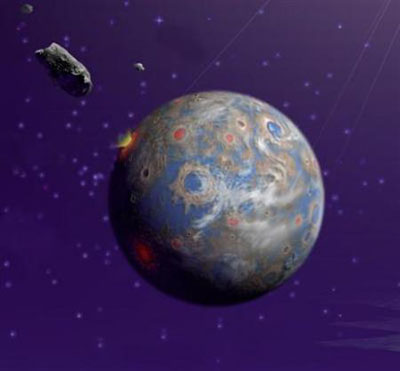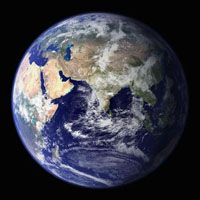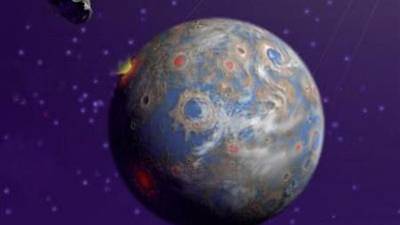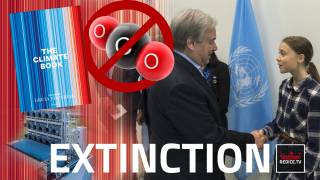Study turns back clock on origins of life on Earth
Source: reuters.com

The bombardment of Earth by asteroids 3.9 billion years ago may have enhanced early life, according to a new University of Colorado study. Credit: NASA/JPL
A heavy bombardment by asteroids the size of Ireland was not enough to wipe out life on Earth 3.9 billion years ago, researchers said on Wednesday in a finding that turns back the clock of life by 500 million years.
Many scientists had thought the violent pelting by massive asteroids during the period known as the Late Heavy Bombardment would have melted the Earth's crust and vaporized any life on the planet.
But new three-dimensional computer models developed by a team at the University of Colorado at Boulder shows much of Earth's crust, and the microbes living on it, could have survived and may even have thrived.
 "These new results push back the possible beginnings of life on Earth to well before the bombardment period 3.9 billion years ago," said Oleg Abramov, a researcher at the university whose study appears in the journal Nature.
"These new results push back the possible beginnings of life on Earth to well before the bombardment period 3.9 billion years ago," said Oleg Abramov, a researcher at the university whose study appears in the journal Nature."It opens up the possibility that life emerged as far back as 4.4 billion years ago, about the time the first oceans are thought to have formed," Abramov said in a statement.
To study this period, Abramov and colleague Stephen Mojzsis used data from moon rocks, meteorite samples and the dented surfaces of neighboring planets to develop a three-dimensional model of this period of bombardment.
"What we did was recreate the Late Heavy Bombardment on a computer," Abramov said, adding that the simulation randomly "smacked the Earth" with giant asteroids.
The team then looked at the impact that would have had on the Earth's temperature in the so-called geophysical habitable zone -- a zone representing the top 2.5 miles of the Earth's crust.
Based on these models, Abramov said this sustained period of impacts would have killed any life on the Earth's surface, but not all life on Earth, as many had assumed.
"We find it is essentially impossible to sterilize the entire habitable zone of the Earth by this kind of bombardment," Abramov said in a telephone interview.
"Certainly, the surface of the Earth was sterilized repeatedly," he said.
But he said hydrothermal vents below the surface of the Earth may have offered sanctuaries for certain heat-loving microbes, and may have even provided a kind of incubator for life.
He said many scientists had thought that a cataclysmic bombardment event would have sterilized the planet and life would have had to start anew.
"The important thing about these results is they push back the possible beginnings of life as we know it," he said.
"Exactly when life originated on Earth is a hotly debated topic," said Michael New, an astrobiologist at the National Aeronautics and Space Administration, which sponsored the research.
"These findings are significant because they indicated life could have begun well before the Late Heavy Bombardment, during the so-called Hadean Eon of Earth's history 3.8 billion to 4.5 billion years ago," New said in a statement.
(Editing by Michael Conlon and Doina Chiacu)
Article from: www.Reuters.com






















